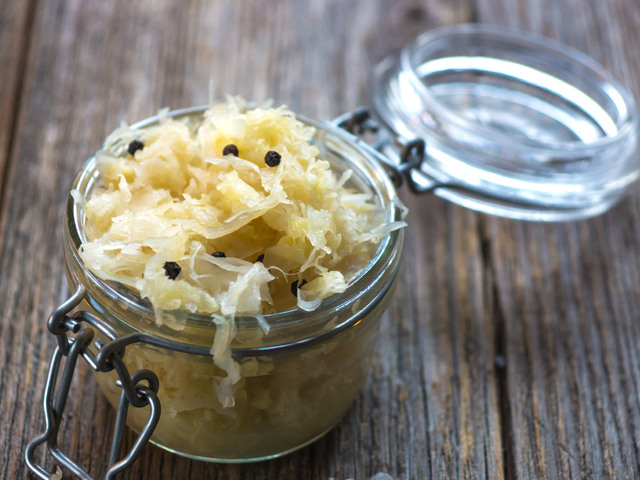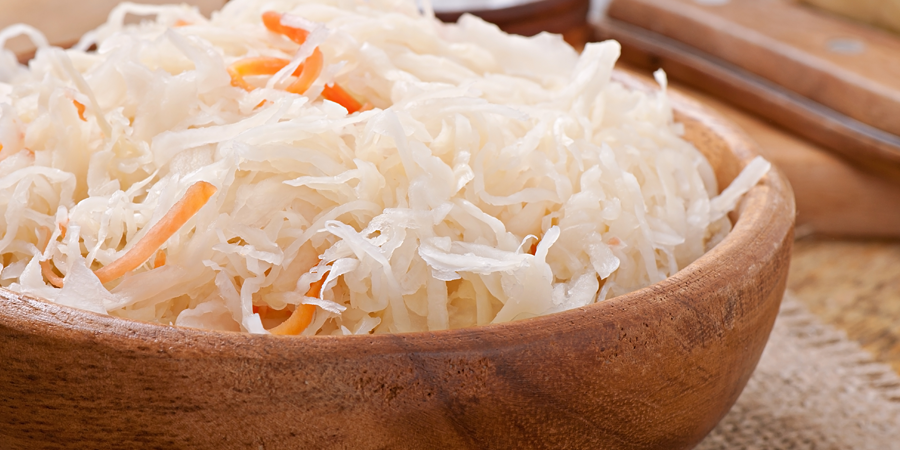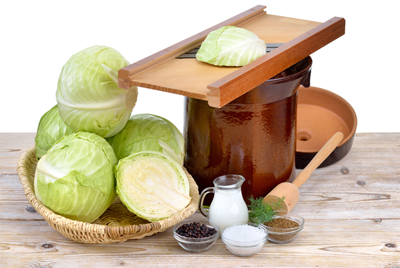Sauerkraut: The Natural Probiotic
If sausages come to mind when you think of sauerkraut, you may be surprised to hear that it is packed with goodness, and is even being thought of as one of the new superfoods!
Not sure what it is exactly?
Sauerkraut is finely cut cabbage that has fermented naturally by various bacteria that already exist on the cabbage. (1)
Love it or hate it for its unique, slightly sour taste, Sauerkraut is one of the greatest probiotic foods there is.
Not only is it low in calories, it’s also dead easy to make, and it makes a great side-order for meats and sausages.
In different parts of the world it’s also popular as a topping on hot-dogs.
A Little History..
Fermented foods go way back, to a time before refrigeration and cheap transportation methods, as a way of preserving foods and their nutrients.
The benefits of sauerkraut have long been known, and it is thought to have originated in Eastern Europe, although the Ancient Roman writer, Cato, mentioned preserving cabbage with salt.
Sauerkraut was an important source of nutrients for sailors on long voyages as a substitute for fresh produce, as well as being easy to transport.
It was thought to protect against skurvy, a common disease amoungst sailors in those days. (2) (3)
It’s popularity spread through countries such as Russia,Ukraine, Poland and Germany, and more recently to the UK and the US.
 How Is Sauerkraut Made?
How Is Sauerkraut Made?
To make it, cabbage is shredded, salted and left to ferment for 4-6 weeks. The salt, via osmosis, pulls water out of the cabbage to form brine that helps protect the kraut while it is fermenting.
(An important note – Use Pickling Salt ONLY on your food and for making sauerkraut, because it’s the purest. Ask Karon at the clinic for the best way of getting this important healthy salt to you.)
Some modern recipes use vinegar, but the traditional method just uses salt and occasionally water to add brine volume.
The process is known as ‘lactic acid fermentation’, whereby glucose in the cabbage is broken down by the bacteria and converted into lactic acid, energy and “good” bacteria.
It is this healthy bacteria that makes the cabbage, or any fermented food, probiotic.
The lactic acid is a natural preservative and stops the growth of harmful bacteria. (4)
Sauerkraut Recipe
Ingredients:
- 2.2 kilograms shredded cabbage
- 2 Dessertspoons pickling salt
- 1 Dessertspoon caraway seeds
Directions:
- In a large bowl, mix cabbage with salt and caraway seeds. Let stand for 10 minutes.
- Pack cabbage mixture into a large glass food container. Top with a quartered onion to fit inside the container, weighing it down. Cover container with a paper towel and secure with a rubber band.
- Place in a cool spot overnight. Check to make sure the sauerkraut is completely submerged in liquid. Check cabbage every other day for 2 weeks, skimming off of any scum that may form on the surface.
- Let stand for at least 4 weeks total. Then store in airtight container in the refrigerator for up to 6 months.
Nutritional Value of Sauerkraut
Sauerkraut is rich in protein and fibre.
It is also high in vitamins A, C, K and B, as well as being a great source of the minerals iron, calcium, manganese, copper and sodium. (1)
It has been found that just 50 grams of homemade raw sauerkraut has more probiotics than a whole bottle of capsules! Every mouthful contains literally billions of good bacteria. (5)
Health Benefits of Sauerkraut
The “good” bacteria in sauerkraut survive in the gut and prevent harmful bacteria and toxins from being absorbed into the body from the gut.
They are therefore vital in maintaining healthy bodily functions and protecting the body from many ailments and chronic diseases. (6)
The main benefits are as follows:
1) Digestive Tract Health
We are what we eat.
Modern medicine has shown us over and over that good general health begins in the gut.
Sauerkraut helps digestion and the absorption of vital minerals, due to its high dietary fibre content.
The probiotic bacteria can prevent digestive tract infections by removing harmful bacteria and toxins such as fungi, viruses and parasites.
As well as preventing food allergies and sensitivities, sauerkraut’s effect on the digestive tract can help prevent conditions such as Irritable Bowel Syndrome, Leaky Gut Syndrome and Ulcerative Collitis.
2) Boosts Immune Function, Reducing Inflammation
The removal of toxins from the digestive tract results in a stronger immune system.
Inflammation in the body is caused by toxins, as these trigger the immune system to produce defense cells and hormones that damage tissues of the body.
Toxins may be environmental, ie from pollution or spray cans, or dietary, from fats and sugars.
Inflammation has been shown to play a crucial role in diseases such as Alzheimer’s, cancer, diabetes, Crohn’s, hypertension, high cholesterol, asthma and arthritis.(7) (8)
Sauerkraut, due to its probiotic, high fibre and anti-oxidant qualities, can help prevent against inflammation.
3) Heart Health
The dietary fibre in sauerkraut helps prevent against heart disease, by binding to fats and cholesterol and removing it from the body.
4) Strong Bones
Both Vitamin C and K are essential for strong bones.
Vitamin K produces the proteins that are needed for bone mineralisation.
Vitamin C helps the absorption of iron into the body, which is also necassary for healthy bones. (9)
5) Blood Health
The iron in sauerkraut is vital for the functioning of red blood cells, which carry oxygen around the body.
Without iron, energy levels drop and anaemia may develop, due to lack of oxygen.
Iron absorption is enhanced not only by the Vitamin C in sauerkraut but also by the lactic acid. (9)
6) Cognitive Function
The nutritional content of sauerkraut has also been shown to enhance brain function, so improving memory and reducing the chance of brain diseases such as Alzheimer’s and dementia.
Probiotics have also been shown to improve mood and combat depression, by altering serotonin and dopamine levels in the cortex of the brain.(7)
In addition, probiotics have been shown to raise the levels of Omega3 in the brain, which has been linked to a more postive mental state, as well as improving communication between nerve cells. (7b)
7) Anti-Carcinogenic Effects
Cabbage is already known to contain large quantities of anti-carcinogenic compounds.
But when it is fermented into sauerkraut, the good bacteria produced release even more cancer-fighting substances, which can reduce the risk of prostate, breast, bladder and colon cancer.
As well as the release of good bacteria, the fermentation process causes the release of the anti-carcinogenic compound isothiocyanite.
This has been shown to inhibit tumour growth and even kill of some cancer cells.
In addition, the enzymes present in sauerkraut juice have been shown to have an anti-carcinogenic effect, particularly in the liver and kidney.
The cancer-fighting properties of sauerkraut are more abundant in raw, unpasteurised, organic sauerkraut, preferably home-made. (10) (11)
 Raw sauerkraut health benefits are numerous, and, although it may not be everyone’s cup of tea, experts are recommending consuming at least 1 1/2 cups, 4-5 times a week! (12)
Raw sauerkraut health benefits are numerous, and, although it may not be everyone’s cup of tea, experts are recommending consuming at least 1 1/2 cups, 4-5 times a week! (12)
A word of caution, though: Sauerkraut consumption may cause bloating and wind at the beginning, until the gut becomes accustomed to processing it.
If you do get bloating or other digestive symptoms stop immediately and once the symptoms have stopped re-start the sauerkraut at a lower dose and usually your body will adjust.
Have no fear, it will pass, and the pros far outweigh the cons! (13)
There is a cautionary note: Despite all of these fantastic health benefits, sauerkraut is very high in sodium, which can be a dangerous dietary addition to people suffering from various heart, circulation and or renal (Kidney) diseases. Speak to your Normal Health Care Professional about an appropriate level of sauerkraut if you suffer from these types of health challenges.
Once again suggesting moderation is essential.
Would you like to find out more?
Until next time,
Yours in Health
From the Team at Unique Health and Wellness
Disclaimer: The information provided does not take into account individual needs of any particular person. When providing this information it is intended as a sharing of knowledge and information from the research. The information provided should not be construed as personal medical advice or instruction and is not intended to replace a one-on-one relationship with a qualified health care professional and is not intended as medical advice. We encourage you to make your own health care decisions based upon your research and in partnership with a qualified health care professional.
References:
1) organicfacts.net?health-benefits/other/sauerkraut
2) en/wikipedia.org/wiki/sauerkraut
3) mariner.org/exploration/index.php
4) EasternEuropeanFood.about.com
5) nourishingplot.com/2104/06/sauerkraut-test-divulge-shocking-probiotic
6) livestrong/1011208-7-surprising-benefits-fermented-food
7) articles.latimes.com/2009/aug/17/health/anti-inflammatory
7b) ncbi.nlm.nih.gov/pubmed/PMC3904694
8) ncbi.nlm.nih.gov/pubmed/16320856
9) livestrong.com/article/277346/benefits of sauerkraut
10) webmed.com/healthy-aging/features/anti-aging diet
11) naturalhealth365.com/0982-raw-sauerkraut-anti-cancer
12) whfoods.com/genpage.php?tname=foodspice
13)ncbi.nlm.nih.gov/pubmed/21092375

 How Is Sauerkraut Made?
How Is Sauerkraut Made?
MORE BLOG STORIES
Breaking Down the B Vitamins
Amazing Ways to Help Heal Mitochondrial Dysfunction!
The 5 Worst Foods For Your Gut
‘THE GOLDEN GODDESS’
Mitochondria, Inflammation and Oxidative Stress
Tired? You May Be Suffering From Mitochondrial Dysfunction